Government of India
Government of India

Knowledge Products
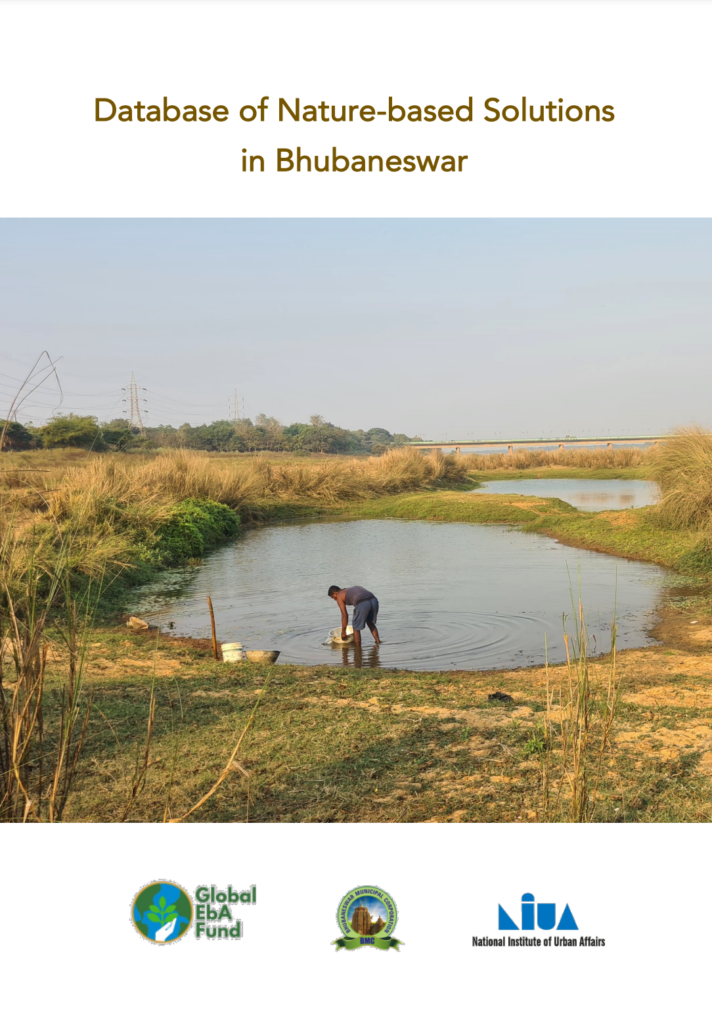
Database of Nature-based Solutions in Bhubaneswar
This document presents a Database of Nature-based Solutions (NbS) in Bhubaneswar, developed under the EPIC project, which identifies and analyses key urban flooding hotspots in the city based on field assessments, risk mapping, and community inputs following recurrent monsoon flooding. From an initial set of flood-prone locations, selected sites were studied in detail to understand flooding patterns, land use, drainage conditions, and surrounding ecosystems, leading to the proposal of site-specific nature-based and ecosystem-based adaptation interventions such as sponge parks, constructed wetlands, drain restoration, riparian buffers, and blue-green public spaces. The database serves as a practical planning resource to support climate-resilient urban water management, flood risk reduction, and sustainable urban development in Bhubaneswar.
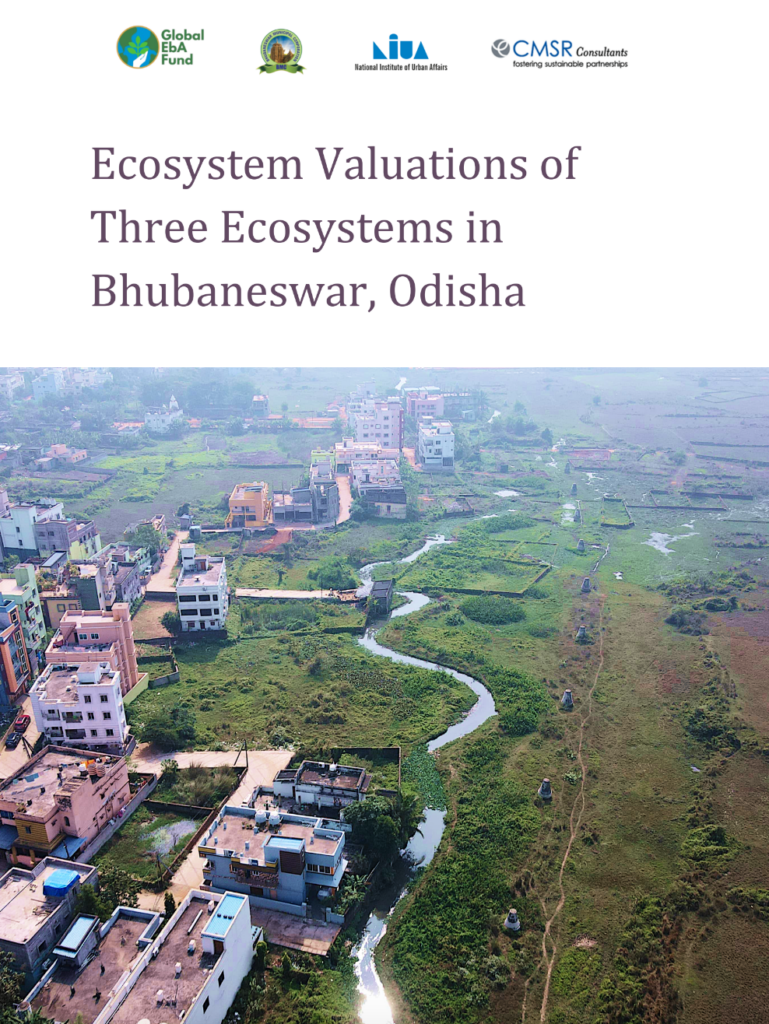
Ecosystem Evaluations of Three Ecosystems in Bhubaneswar, Odisha
This study, conducted under the “Proliferating Ecosystem-based Adaptation (EbA) Practices in Indian Cities” (EPIC) project supported by the Global EbA Fund, assesses the ecological, socio-cultural, and economic value of three key urban ecosystems in Bhubaneswar: Bindusagar Lake, Jaidev Vatika, and a wetland. As part of the EPIC project’s efforts to demonstrate the economic valuation of urban ecosystems, the study engaged 769 stakeholders—including residents, visitors, and informal workers—to capture diverse perspectives on ecosystem use, benefits, and conservation needs.
Using a comprehensive mixed-methods approach, the research integrates quantitative and qualitative data to provide a holistic understanding of how these urban commons function within the city’s ecological and social landscape. The findings aim to inform urban planning and climate resilience strategies, highlighting the role of nature-based solutions in enhancing ecosystem protection and sustainable urban development in Bhubaneswar.
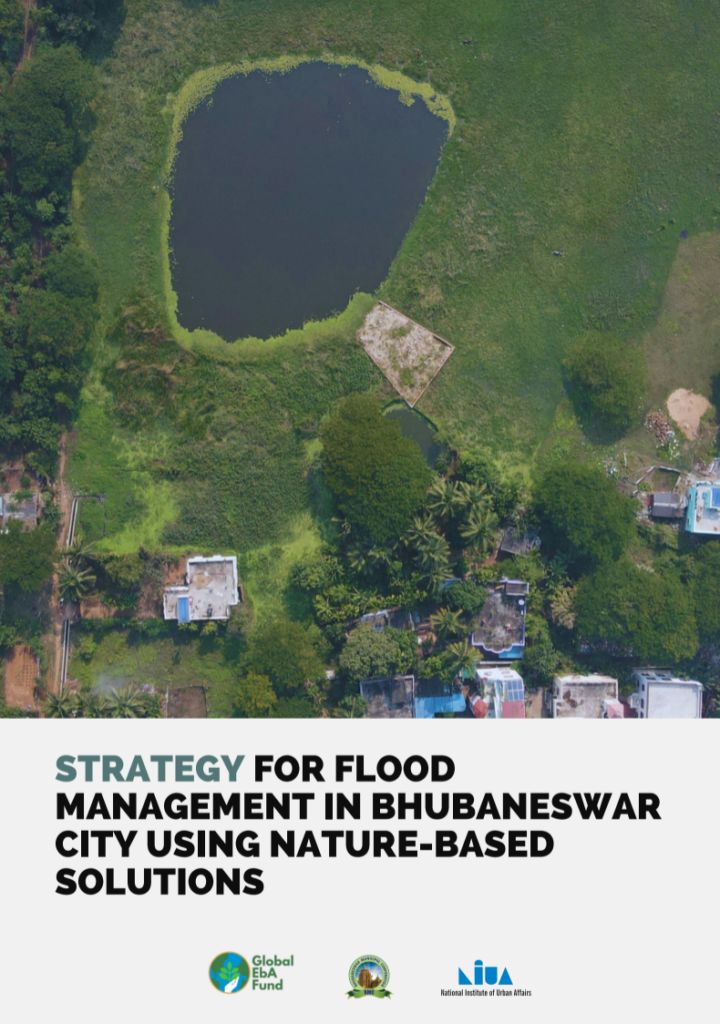
Strategy for Flood Management in Bhubaneswar City using Nature-based Solutions
This strategy document presents nature-based solutions for managing urban flooding in Bhubaneswar, developed under the “Proliferating Ecosystem-based Adaptation (EbA) Practices in Indian Cities” (EPIC) project, supported by the Global EbA Fund.
Bhubaneswar, selected as the pilot city, underwent a detailed baseline assessment to identify flood hotspots and vulnerable areas. Simultaneously, the city’s natural ecosystems were mapped to assess their potential in mitigating flood risks. Based on this analysis, targeted nature-based interventions were designed for twelve critical locations. The document provides a comprehensive account of the methodology and process used to integrate ecosystem-based solutions into the city’s flood management strategy, offering a practical roadmap for urban resilience planning.
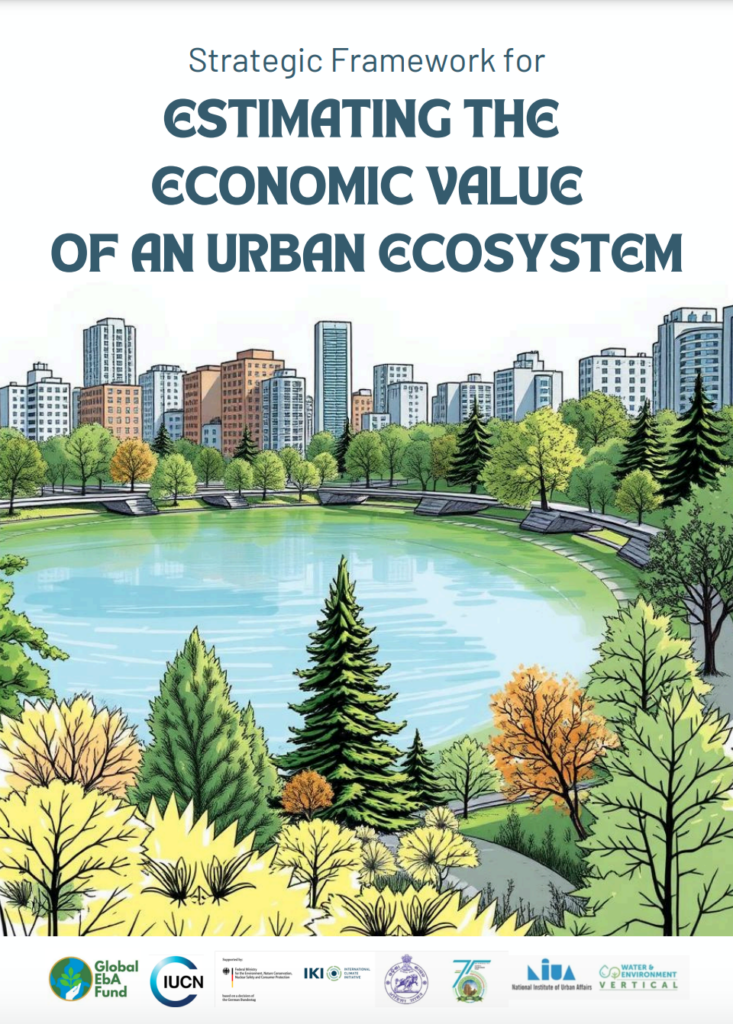
Strategic Framework for Estimating the Economic Value of an Urban Ecosystem
Water is the primary medium through which the impacts of climate change are felt, with cities worldwide facing increased flooding, water scarcity, and related challenges. In India, urban areas experience frequent floods alongside growing summer water shortages, making water security central to climate adaptation strategies.
The National Institute of Urban Affairs (NIUA), with support from the International Union for Conservation of Nature (IUCN), implemented the “Proliferating Ecosystem-based Adaptation (EbA) Practices in Indian Cities” (EPIC) project under the Global EbA Fund. Using Bhubaneswar, Odisha, as a pilot city, the project demonstrates how ecosystem-based adaptation can help cities address flooding and water scarcity. A key component of this effort is the economic valuation of urban ecosystems—such as wetlands, forests, floodplains, and riparian buffers—to highlight their tangible benefits for climate resilience. This Strategic Framework simplifies the process of valuing ecosystem services, providing a step-by-step methodology for policymakers, urban planners, and practitioners to make evidence-based decisions, strengthen ecosystem-based planning, and integrate nature into urban water management.
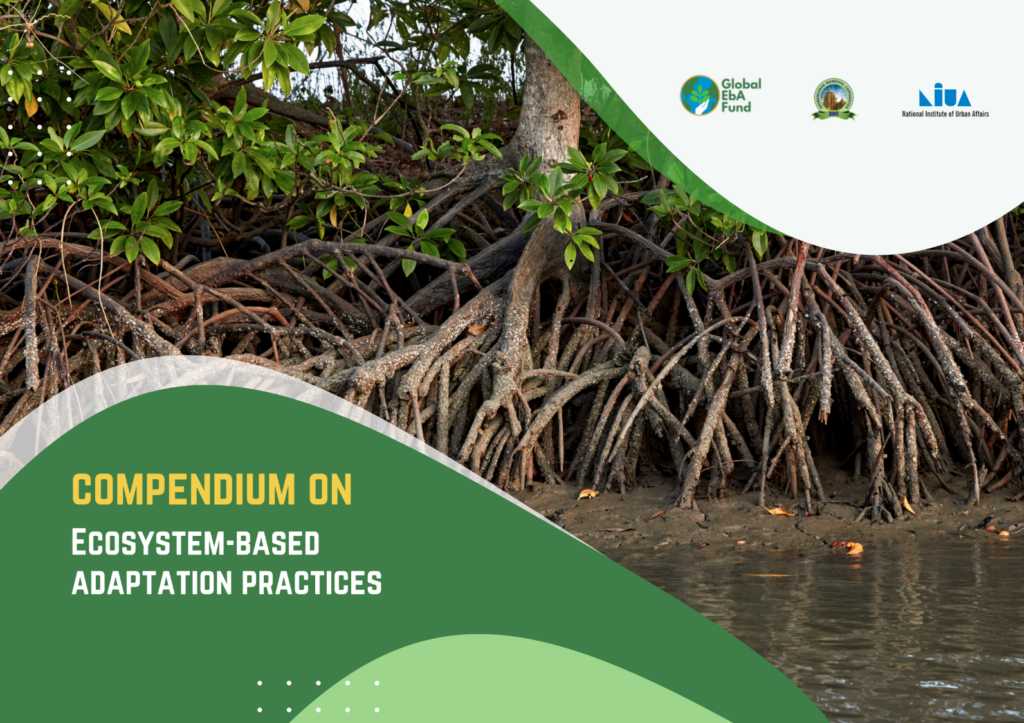
Compendium on Ecosystem-based Adaptation Practices
Climate change poses growing risks through extreme weather, water scarcity, biodiversity loss, and climate-related disasters, particularly in developing countries like India. Ecosystem-based Adaptation (EbA) offers a nature-driven, cost-effective approach to building climate resilience by conserving, restoring, and sustainably managing ecosystems while delivering co-benefits such as improved livelihoods, water security, and biodiversity conservation.
This Compendium on Ecosystem-based Adaptation Practices presents a curated selection of global and regional case studies across diverse landscapes, showcasing practical EbA interventions and their impacts. Developed under the “Proliferating Ecosystem-based Adaptation Practices in Indian cities” (EPIC) project supported by the Global EbA Fund, the compendium serves as a resource for policymakers, planners, and practitioners seeking scalable and actionable pathways to integrate EbA into climate and development planning.
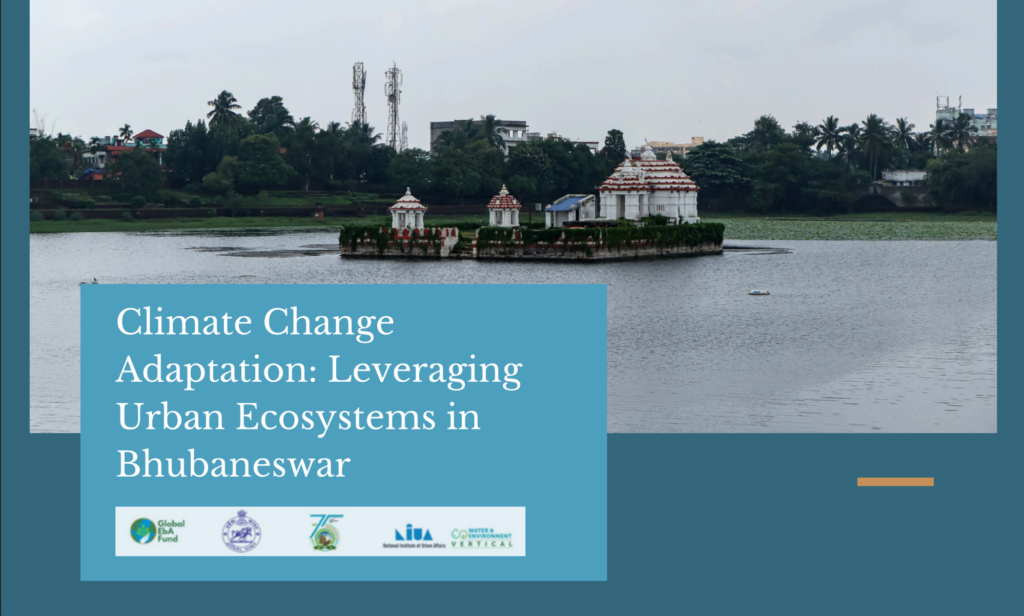
Climate Change Adaptation: Leveraging Urban Ecosystems in Bhubaneswar
This document presents a comprehensive compilation of thematic maps aimed at supporting the strategic use of urban ecosystems for climate change adaptation in the city of Bhubaneswar, Odisha. It analyzes patterns of urban development and growth in relation to key climate change impacts, with a particular focus on urban heat stress and urban flooding. Through spatial analysis, the document highlights how different forms of urbanization interact with natural systems and influence climate vulnerability. Each urban ecosystem is described in detail, outlining its characteristics and the range of ecosystem services it provides, such as temperature regulation, flood mitigation, and environmental resilience, thereby emphasizing their role in sustainable urban planning and climate-responsive development. This publication has been prepared under the project “Proliferating Ecosystem-based Adaptation Practices in Indian cities (EPIC)” supported by the Global EbA Fund.
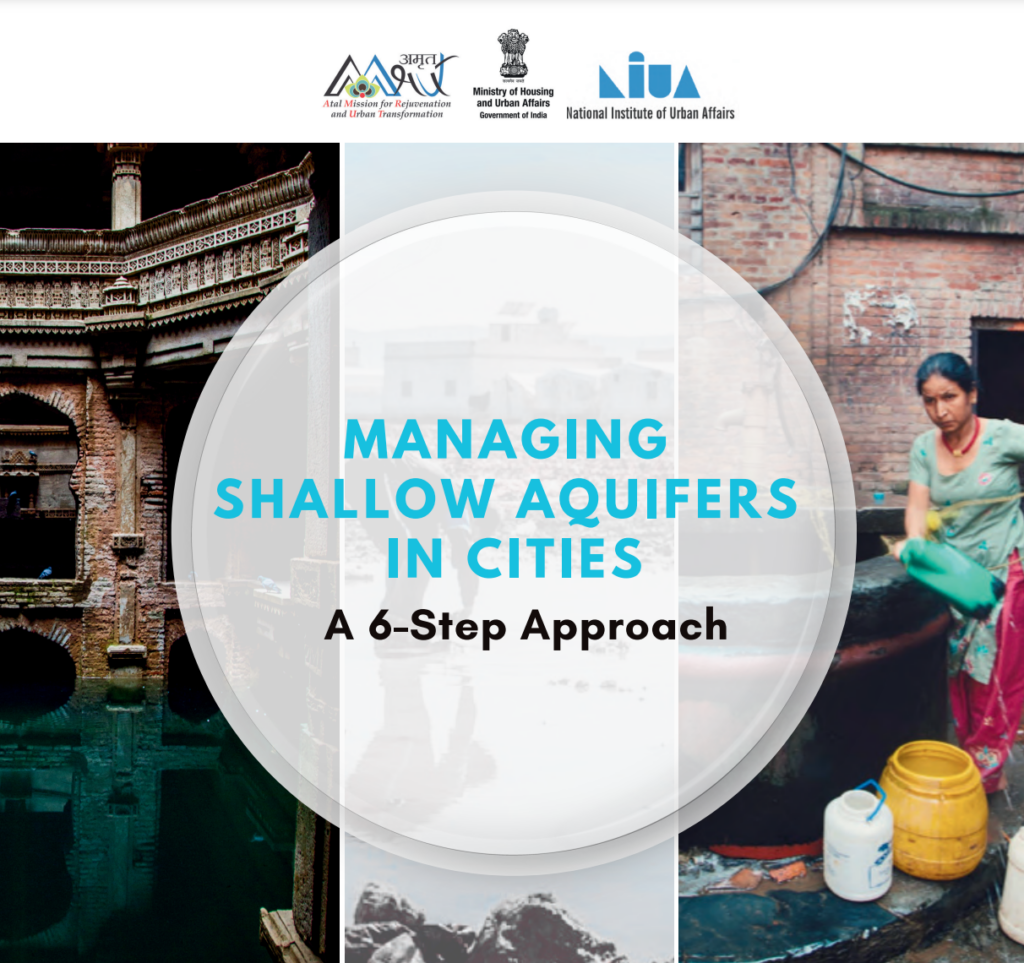
Managing Shallow Aquifers in Cities: A 6-Step Approach
The National Institute of Urban Affairs (NIUA) is supporting ten cities under the Atal Mission for Rejuvenation and Urban Transformation (AMRUT) 2.0 to advance sustainable shallow aquifer management (SAM) in urban areas. This pioneering initiative addresses the unique and complex challenges of managing shallow aquifers at the city level by adopting a participatory mapping approach that involves local stakeholders, technical experts, and municipal institutions. It is the first time that shallow aquifer management has been implemented at a city-wide scale across India, marking a major step forward in decentralised urban water governance. The participatory process ensures that scientific knowledge is combined with local insights, thereby creating more accurate and context-specific aquifer maps and management strategies. Drawing on the practical learnings and field-level experiences from these ten SAM cities, NIUA and its partners have co-developed a first-of-its-kind national toolkit. This comprehensive document outlines a structured 6-Step Approach to Managing Shallow Aquifers in Cities and is designed to be used by urban planners, municipal officials, and water professionals. It aims to guide cities in planning, implementing, and monitoring effective aquifer management solutions that enhance groundwater sustainability and climate resilience in the long term.
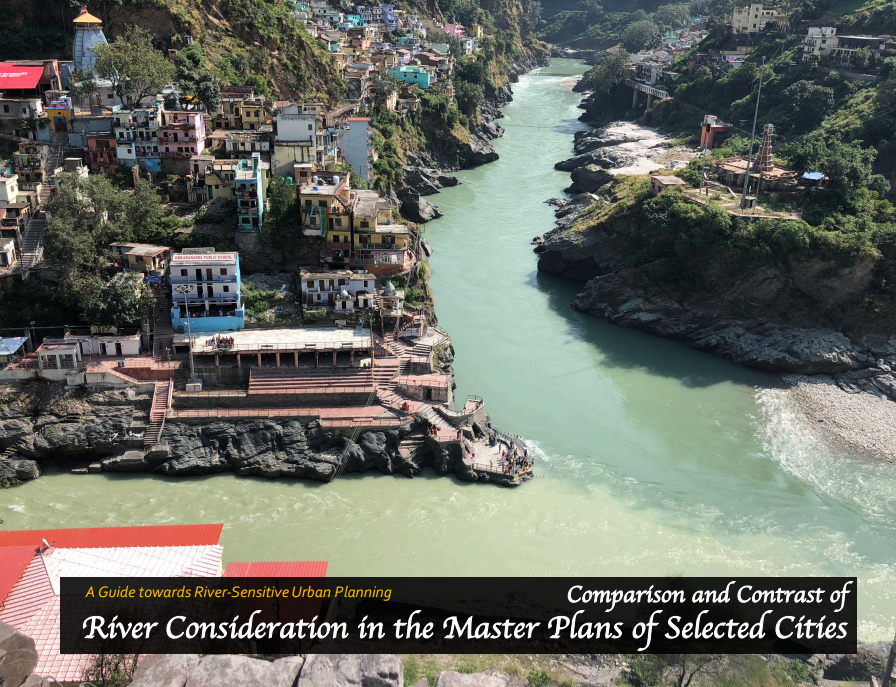
A Guide towards River-Sensitive Urban Planning
National Institute of Urban Affairs (NIUA) & National Mission for Clean Ganga (NMCG) prepared a knowledge product on ‘Comparison and Contrast of River Consideration in the Master Plans of Selected Cities’. This document shares examples of river-related aspects adopted by Master Plans of various cities.

Innovations in Urban River Management
With the advancement of knowledge, percolation of information and technology and increasing awareness among citizens, efforts have already been made across the globe to come up with unique and out-of-the-box initiatives for river management. National Institute of Urban Affairs (NIUA) & National Mission for Clean Ganga (NMCG) prepared a knowledge product on ‘Innovations in Urban River Management’. The purpose of this product is to showcase innovations, especially to city governors and administrators, in order to help them identify possible solutions for local issues. Several innovative case examples from the domain of Information & Technology, Robotics, Artificial Intelligence, Geographic Information Systems, etc. are presented in this product.
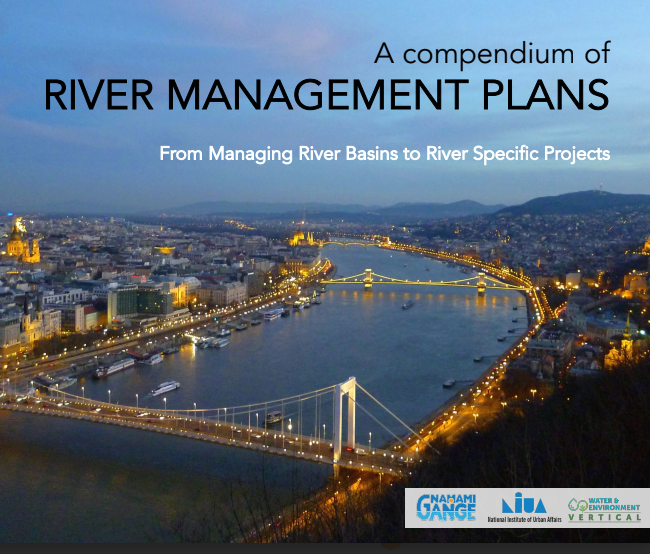
A Compendium of River Management Plans – From Managing River Basins to River Specific Projects
National Institute of Urban Affairs (NIUA) & National Mission for Clean Ganga (NMCG) prepared a knowledge product titled ‘A Compendium of River Management Plans’. This product tries to capture some of the best practices adopted for effective river management across the globe, while emphasizing the need of comprehensive river management for addressing the issues faced by river cities in India. The case examples incorporated in this Knowledge Product highlight the globally prevalent river management practices, with a focus on key strategies for – ecological restoration of the river (Environment); enabling the re-connect of people with the river (Social) and; boosting the livelihoods of people associated with river activities (Economy). An assessment of such attempts can provide an opportunity to adopt and replicate them.
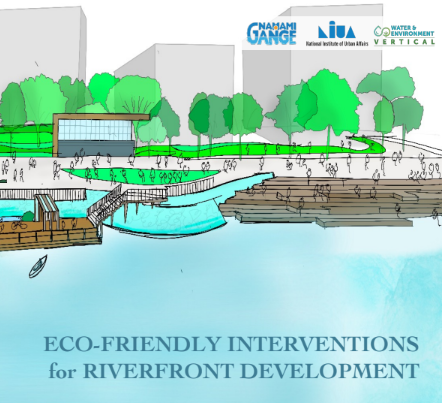
Eco-friendly Interventions for Riverfront Development
Rivers play an intrinsic role in community engagement. They have vast potential for activating a city’s social, economic as well as cultural life. River edges, owing to their natural character and landscape, are ideal locations for exploring the potential of ecologically developed recreational areas within the city. National Institute of Urban Affairs (NIUA) & National Mission for Clean Ganga (NMCG) prepared a knowledge product on ‘Eco-friendly Interventions for Riverfront Development’. This knowledge product showcases a set of best practices, with eco-friendly interventions and specific elements, that can be adopted for environmentally sensitive, economically viable and socially cohesive development of the urban riverfronts. A mix of practices can be adopted together as per the local needs, to achieve the desired goal of developing eco-sensitive riverfronts, which also improves the social connect while maximising the economic potential of the river.
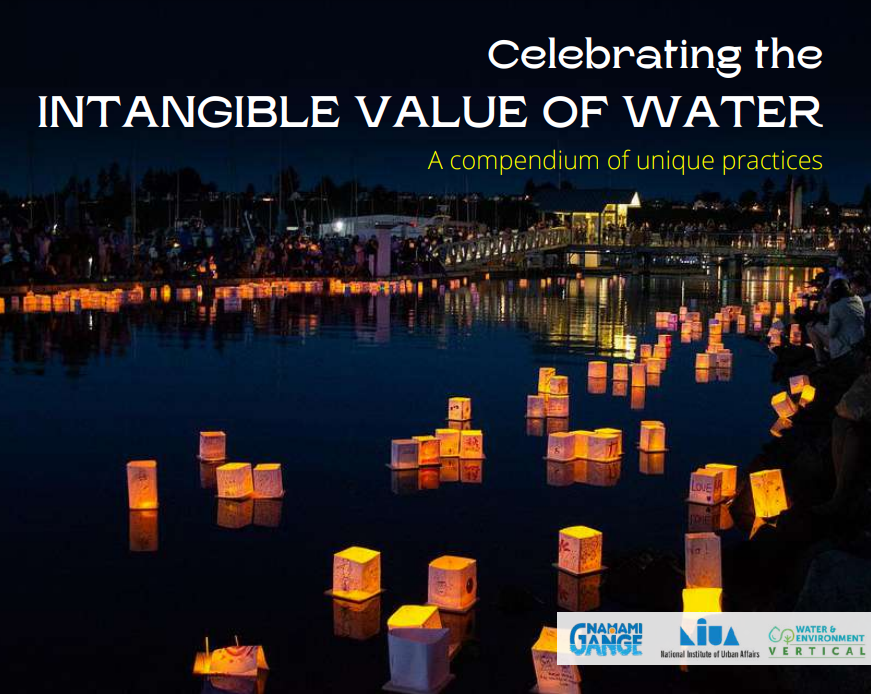
Celebrating the Intangible Value of Water
Perhaps no other natural resource is as significant as water in the path to sustainable development. Achieving water security is, therefore, a top priority for governments across the world, through various policies, plans, and projects. It is important that such initiatives acknowledge and leverage on the intangible value of water as a means to enhance the overall water security of the region. The intangible value of water is found in almost every country through unique cultures, traditions, festivals, and rituals. This underscores the intrinsic place of water in society, far beyond merely being a source of meeting basic human needs. As the adage goes, what we cherish, we value, and what we value, we protect. Leveraging on the intangible value of water can, therefore, serve as a sound strategy to ensure its judicious use. National Institute of Urban Affairs (NIUA) & National Mission for Clean Ganga (NMCG) prepared a knowledge product on ‘Celebrating the Intangible Value of Water’. This compendium highlights unique examples from different corners of the world where the intangible value of water is celebrated through customs, traditions, festivals, and beliefs.
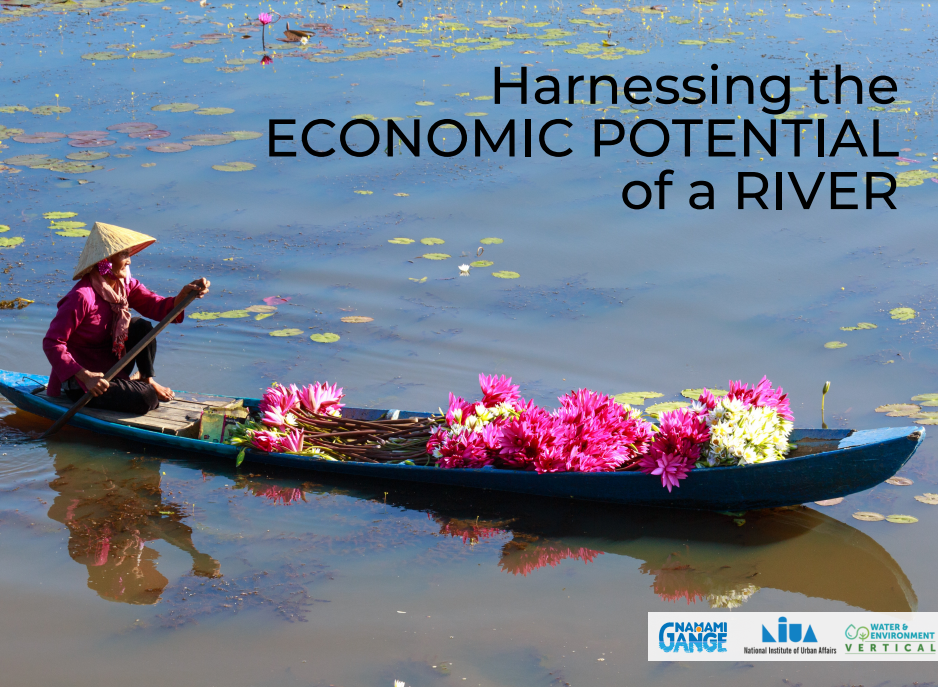
Harnessing the ECONOMIC POTENTIAL of a RIVER
National Institute of Urban Affairs (NIUA) & National Mission for Clean Ganga (NMCG) prepared a knowledge product on ‘Harnessing the ECONOMIC POTENTIAL of a RIVER’. This knowledge product is a compilation of river-related activities from across the world, that have helped in leveraging the economic potential of the river ecosystems.
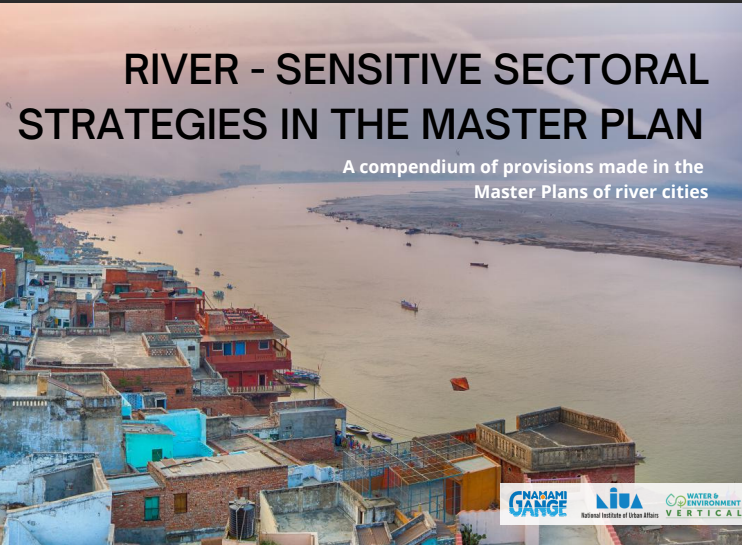
River-Sensitive Sectoral Strategies in the Master Plan
National Institute of Urban Affairs (NIUA) & National Mission for Clean Ganga (NMCG) prepared a knowledge product on ‘River-Sensitive Sectoral Strategies in the Master Plan – a compendium of provisions made in the Master Plans of river cities’. This document is a compilation of sectoral provisions made in the Master Plans of river cities across the globe, for shelter, mobility, infrastructure, heritage or economy, that have an indirect connection with urban river management.
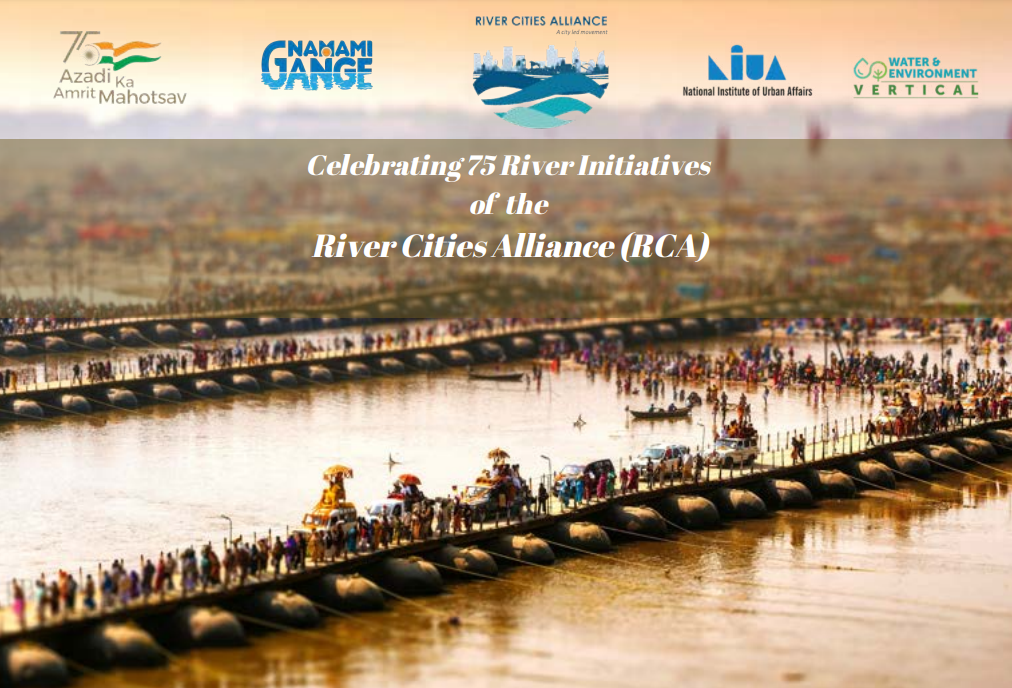
Celebrating 75 River Initiatives of the River Cities Alliance (RCA)
The National Institute of Urban Affairs (NIUA) and the National Mission for Clean Ganga (NMCG) have prepared a compendium on ‘Celebrating 75 River Initiatives of the River Cities Alliance (RCA).The compendium presents seventy-five examples of river-related initiatives undertaken by alliance member cities. The budgets for these interventions are mostly from the ULB-owned funds, national missions like SBM, AMRUT and NMCG. Several interventions are funded through CSR contributions.
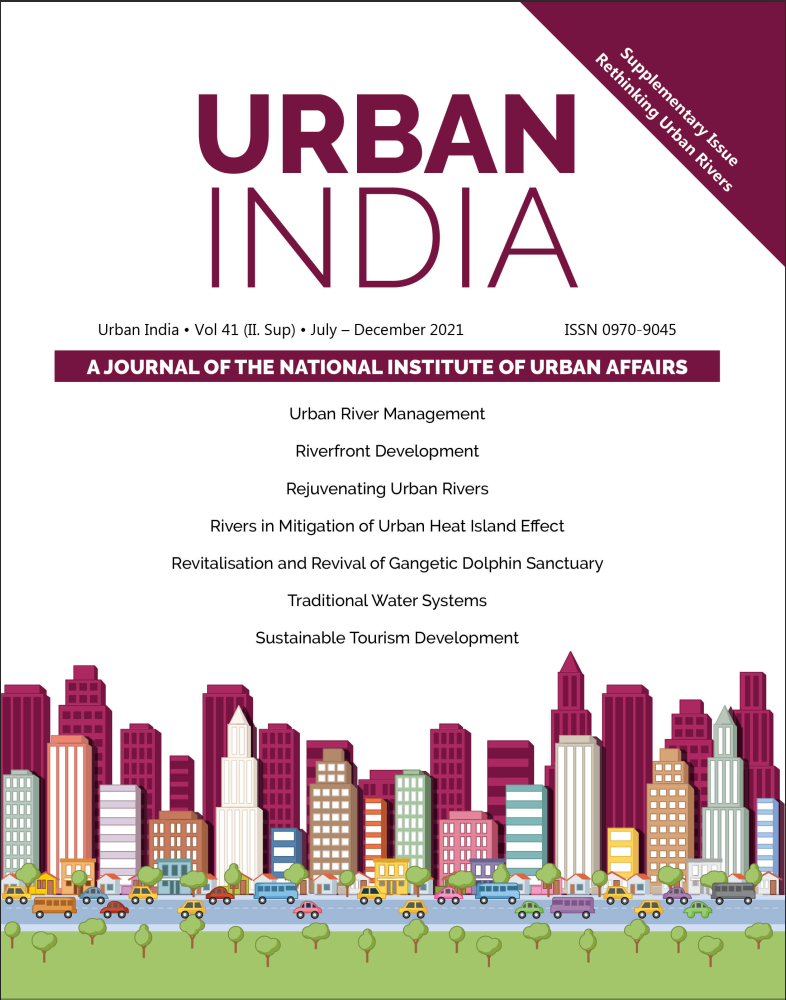
Urban India: STC 1.0 Supplementary Edition
This supplementary edition of Urban India, the National Institute of Urban Affairs’ (NIUA) bi-annual journal, contains eight cutting-edge research articles written by the student finalists of the Student Thesis Competition (STC), Season 1, along with various sector experts. STC is conducted annually by NIUA in collaboration with the National Mission for Clean Ganga (NMCG) to provide a platform for students to pitch their innovative research proposals, and gain financial and academic support. In 2021, students developed their projects across various thematics such as riverfront development, rejuvenating urban rivers, mitigating the urban heat island effect, promoting river tourism, and many others. Their research has been made available nation-wide in this special edition, which contains their groundbreaking case-studies on the Hooghly River (Kolkata), Kaliasot River (Bhopal), Yamuna River (Mathura and Delhi), Ganga River (Bihar), and Sarayu River (Ayodhya) – providing a comprehensive overview of the riverine ecosystem of urban India.
[Urban India, Vol 41 (II. Sup), July-December 2021, ISSN 0970-9045]
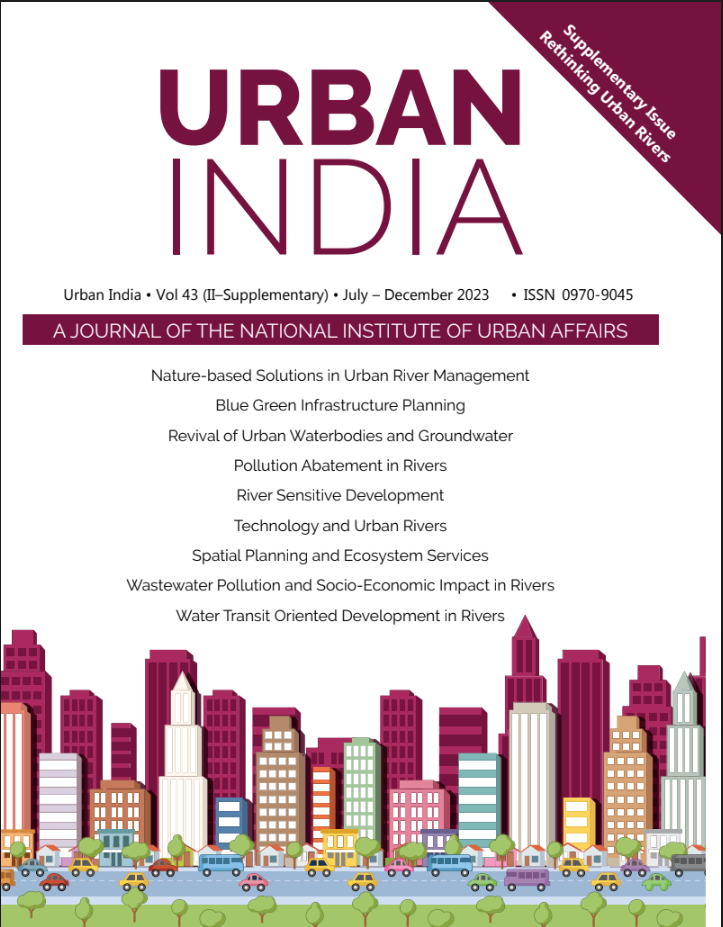
Urban India: STC 2.0 Supplementary Edition
Volume 43 of Urban India, the National Institute of Urban Affairs’ (NIUA) bi-annual journal, contains nine pioneering research articles written by the student finalists of the Student Thesis Competition (STC), Season 2, along with various sector experts. STC is conducted annually by NIUA in collaboration with the National Mission for Clean Ganga (NMCG) to provide a platform for students to pitch their innovative research proposals, and gain financial and academic support. In 2022, students across India developed their projects across various thematics such as blue green infrastructure planning, the revival of urban waterbodies and groundwater, pollution abatement in rivers, wastewater pollution, engaging citizens in river management activities, and many others. Research conducted by successful student candidates has been published in this supplementary edition of Urban India, now available to all. This edition dives deep into various well-rounded case studies on the Thamirabarani River (Tirunelveli), Shekha Jheel (Aligarh), River Ganga, Assi and Varuna River (Varanasi), Hooghly River (Kolkata), the Cauvery Basin, Yamuna River (Delhi), and Jhelum River (Srinagar) – where students have offered their valuable insights and evidence-based policy inputs on urban river management in India.
[Urban India, Vol 43 (II-Supplementary), July-December 2023, ISSN 0970-9045]
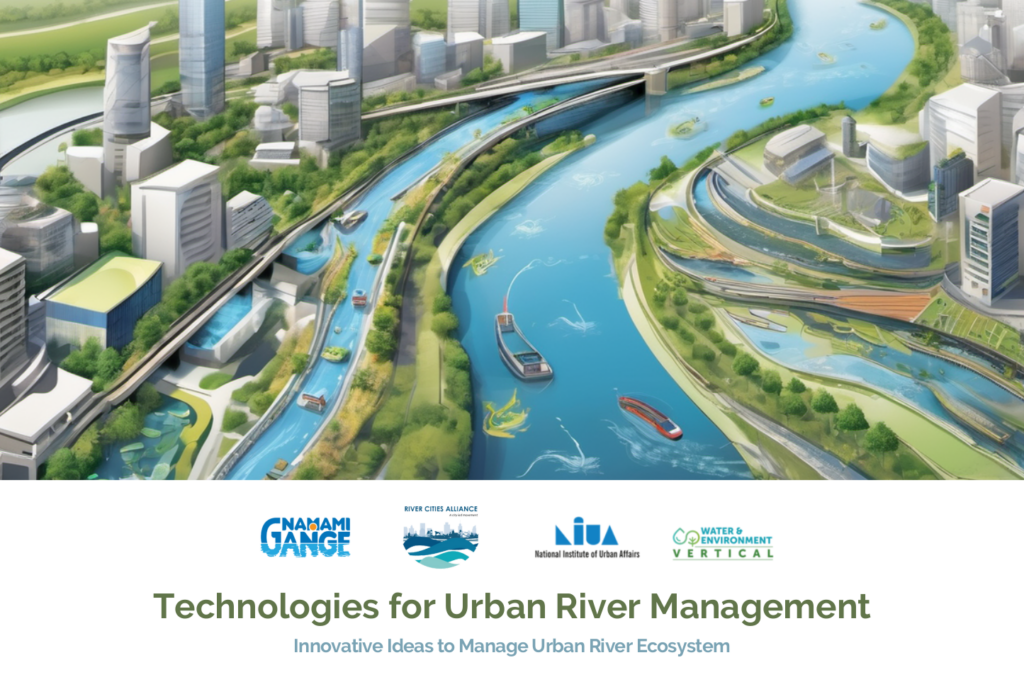
Technologies for Urban River Management
The compendium is a comprehensive collection that encompasses over 30 distinct technologies, each developed by various institutions and private companies. These technologies are specifically designed to rejuvenate and manage the river and its associated elements. Spanning a wide range of approaches and methodologies, these innovations address various aspects of river management, including water quality improvement, sedimentation control, habitat restoration, improving people river connect, augmenting groundwater, improved data management and biodiversity conservation. By bringing together diverse expertise and innovative solutions, the compendium serves as a valuable resource for stakeholders involved in river conservation and management efforts.


